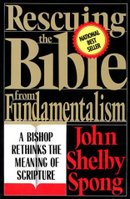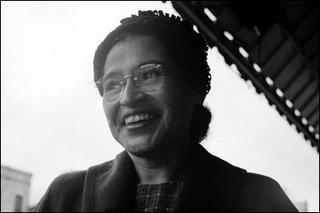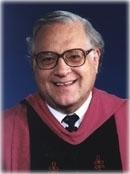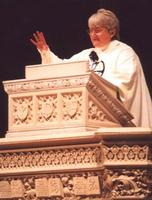 Recently Los Angeles pastors received a letter from their Executive Minister, Dr. Samuel S. Chetti, inviting them to attend a meeting with the four principal members of the ABCUSA management team. This will take place the same week as Dr. Medley and his team make appearances in National City, Redlands, and Pasadena (all PSW venues). "His Barking Dog" offers readers the complete text of Dr. Chetti's letter with some analysis and reflections by your blogger.
Recently Los Angeles pastors received a letter from their Executive Minister, Dr. Samuel S. Chetti, inviting them to attend a meeting with the four principal members of the ABCUSA management team. This will take place the same week as Dr. Medley and his team make appearances in National City, Redlands, and Pasadena (all PSW venues). "His Barking Dog" offers readers the complete text of Dr. Chetti's letter with some analysis and reflections by your blogger.
October 24, 2005
Dear Colleagues in Ministry:
Greetings in the name of our Lord and Savior Jesus Christ.
I would like to take this opportunity to invite you and your ministry staff to a very important meeting regarding the issue of homosexual lifestyle and the current crisis within the American Baptist family of congregations.
We will meet on Wednesday, November 9, 2005 from 10:00 a.m. - 12 noon at First Baptist Church, Los Angeles - 760 S. Westmoreland Ave. - Los Angeles, (213) 384-2151. (Light refreshments will be served prior to the meeting).
Present at this meeting will be Rev. Roy Medley, General Secretary, Rev Dr. Sumner Grant, Executive Director, MMBB, Rev. Dr. Aidsand Wright-Riggins, Executive Director, National Ministries and Rev. Charles Jones, Acting Executive Director of International Ministries. They will answer questions as well as explain the mission and vision of American Baptist Churches, USA and it’s ministries.
The program will begin with my presentation of the American Baptist Churches of Los Angeles stand on the issue of the homosexual lifestyle and how this region is responding to the crisis. This will be followed by the presentation from our national staff.
Please be in prayer regarding this meeting and be present with us to address this issue. Looking forward to seeing you on November 9th. Please call (213) 955-4941 to confirm your attendance and the number of staff people that will be in attendance.
In the bonds of Christ,
(Signed: Dr. Samuel S. Chetti)
One can note a difference in agenda from the visit by Dr. Medley and ABCUSA President Peggy Johnson to PSW in September. Then the purpose was to listen to pastors articulate their concerns to the leadership of the ABCUSA. Now the ostensible reason for the meeting is to receive a "presentation from our national staff." Dr. Chetti advertises that the time will include both questions from the audience AND an opportunity for the ABCUSA management team to "explain the mission and vision of the ABCUSA."
Several months ago, Dr. Jeff Woods, Associate General Secretary for Regional Relationships, reportedly suggested that the issue of homosexuality was not a significant problem to the ABCUSA. In an extended meeting with several executive ministers at his house, he advanced the view that if the denomination keeps its focus on the outcome of the recent "Seek It" process, "we will be fine." Clearly, part of the agenda in the three PSW venues and the visit to the First Baptist Church of Los Angeles in early Novemeber will deal with a positive statement of denominational vision and mission. The presentation of the newly adopted mission/vision statement coming out of "Seek It" has been somewhat muted and eclipsed by crises as Valley Forge leaders have been compelled to deal with the PSW and other regional discontent.
Following the script of Hossler Communications, our ABCUSA re-branding consulting firm, Valley Forge has already held two meetings with selected leaders from throughout the country designed to rally support for the beleaguered national leadership. The pirated memo from the Office of the General Secretary, dated May 18, 2005, released earlier in the summer by ABE, identified the need to follow up the Biennial with "the pro-ABC word" in order to "counter the responses from dissatisfied regions that will likely occur."
The question remains: Will the visit by the Four Horsemen of Valley Forge accomplish the purposes it has been set out to or not? Some pastors have already expressed a disinclination to attend the meetings. In September, the pastoral and congregational leaders sent Dr. Medley and President Johnson back to Valley Forge with a collective cry, "Enough!" Several have suggested that their presence at these new meetings might be misinterpreted as support for the national leadership.
Others have been exhorting pastors to attend the gatherings, lest the disproportionate presence of Valley Forge supporters be taken to suggest congregational dissatisfaction with the PSW leadership. The appearance in Los Angeles carries an entirely different set of connotations since Dr. Chetti has consistently positioned his region as broadly evangelical but totally supportive of denominational unity. It will be interesting to see if this difference in context translates into a friendlier ambiance than in the three PSW meetings.
[The comments in this blog belong to the author solely and should not be confused with the official position of the PSW or of any person or entity within the PSW]
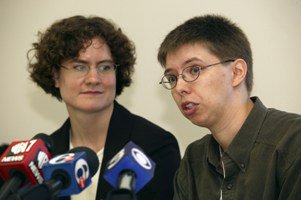 Beth Stroud (left) and her partner Chris at press conference (Photo Courtesy UMNS / Mike Dubose)
Beth Stroud (left) and her partner Chris at press conference (Photo Courtesy UMNS / Mike Dubose)


